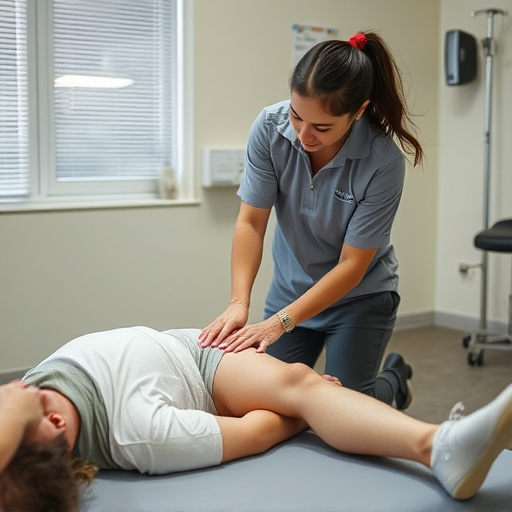OWCP (Occupational Safety and Health Administration) accepted providers specialize in post-accident rehabilitation, focusing on functional capacity evaluations (FCEs) to assess work abilities for safe worker recovery. These evaluations, integrating various healthcare professionals' expertise, tailor rehab services for specific conditions like sciatica or neck pain, leading to improved mobility and better patient outcomes. Accurate FCEs require qualified experts in a suitable environment, ensuring consistent assessments aligned with OWCP standards.
In the complex landscape of workers’ compensation, understanding OWCP (Occupational Safety and Health Administration) accepted provider requirements is paramount for effective rehabilitation. This article delves into the intricacies of these evaluations, focusing on how healthcare professionals can conduct functional capacity assessments accurately. We explore key considerations to ensure compliance with OWCP standards, ultimately enhancing patient outcomes and facilitating smoother return-to-work transitions. By understanding these processes, providers can optimize their role in the workers’ compensation system.
- Understanding OWCP Accepted Provider Requirements
- Conducting Functional Capacity Evaluations Effectively
- Key Considerations for Accurate Assessment Results
Understanding OWCP Accepted Provider Requirements

When it comes to understanding OWCP (Occupational Safety and Health Administration) accepted provider requirements, it’s crucial to grasp that these providers are specifically chosen and approved to deliver quality care within the workers’ compensation system. This approval ensures that healthcare services, including post-accident rehabilitation for conditions such as lower back pain or whiplash treatment, meet established standards of excellence.
OWCP accepted providers play a vital role in facilitating efficient and effective recovery processes. Their expertise lies in conducting functional capacity evaluations (FCEs), which are comprehensive assessments designed to determine an individual’s ability to perform work-related tasks after an injury or illness. These evaluations are essential tools that help workers return to their jobs safely and effectively, whether it involves managing lower back pain through rehabilitation or addressing symptoms of whiplash.
Conducting Functional Capacity Evaluations Effectively

Conducting Functional Capacity Evaluations (FCE) effectively is paramount for OWCP accepted providers aiming to deliver quality care and optimize patient outcomes. These evaluations go beyond simple physical assessments by considering a patient’s ability to perform activities relevant to their job or daily life, addressing both current limitations and potential areas of improvement. A well-structured FCE involves a multi-disciplinary approach, where physicians, physical therapists, and other healthcare professionals collaborate to assess various functional domains, including strength, flexibility, endurance, and coordination.
By integrating specialized rehab services tailored to address specific conditions, such as sciatica treatment, providers can significantly enhance mobility improvement. This holistic assessment and intervention strategy ensures that patients receive comprehensive care aligned with their unique needs, ultimately fostering better recovery outcomes and smoother transitions back to work or daily routines.
Key Considerations for Accurate Assessment Results

When conducting Functional Capacity Evaluations (FCEs) for OWCP-accepted providers, several key considerations are essential to ensure accurate assessment results. One crucial aspect is selecting a qualified and experienced provider who understands the OWCP guidelines and requirements. An OWCP-accepted provider has met specific standards and is approved to conduct these evaluations, ensuring reliability and consistency in the process. This expertise is vital for interpreting the results correctly and making informed decisions regarding an individual’s disability benefits.
Additionally, the environment where the FCE takes place matters. A well-equipped and controlled setting allows for a more precise evaluation of an individual’s capabilities. For instance, when dealing with neck pain treatment or sports injury recovery, a quiet, distraction-free space enables the evaluator to observe and measure specific tasks without external factors influencing the outcome. This attention to detail helps in providing accurate feedback and supporting claims related to wellness care, ultimately leading to more effective disability management strategies.
OWCP accepted providers play a crucial role in ensuring accurate and effective functional capacity evaluations. By adhering to strict guidelines and employing comprehensive assessment strategies, professionals can deliver reliable results. Understanding the requirements and considering key factors are essential steps to ensure these evaluations meet OWCP standards. This enables injured workers to receive appropriate benefits and support for their road to recovery.














